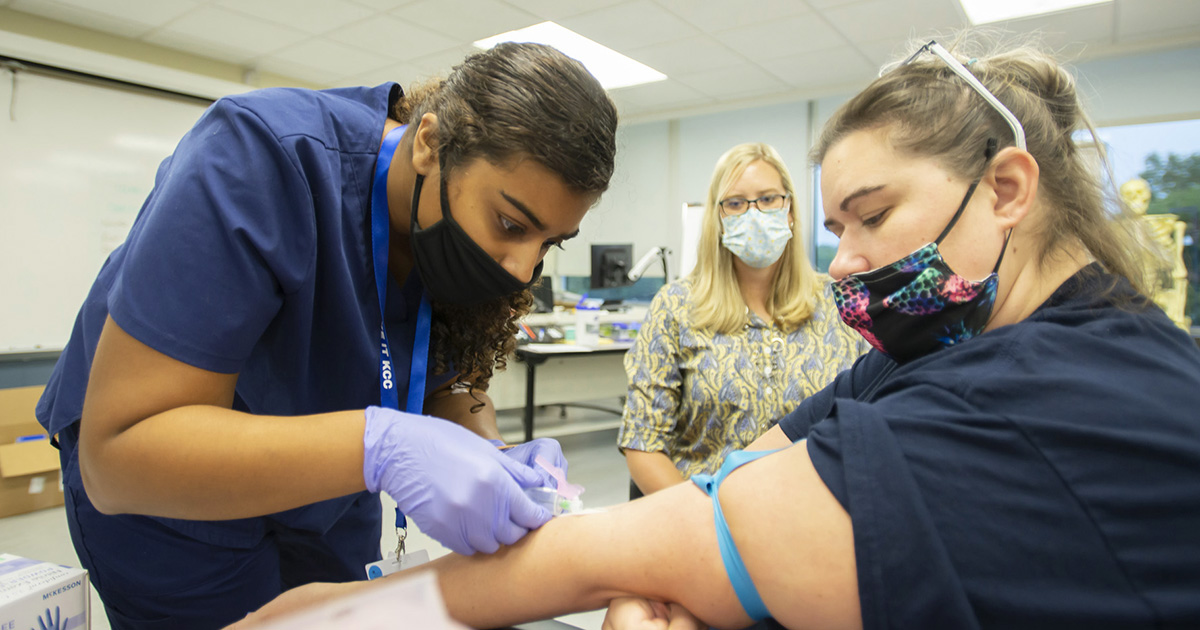The Course to Accreditation: Recognizing the Phlebotomy Educating Program Journey and Its Value
As you take into consideration the path to certification in phlebotomy, it is necessary to comprehend the function you'll play in healthcare. Your training will cover important skills, from blood collection techniques to patient interaction. Each part of the program prepares you for the obstacles in advance. Yet just what does the journey involve, and why is certification so essential for your future career? Let's discover these concerns additionally.

The Function of Phlebotomists in Healthcare
Phlebotomists play an important duty in the health care system, working as the essential web link between clients and essential analysis testing. You'll do blood attracts, guaranteeing samples are accumulated precisely and securely. Your experience assists in detecting medical problems, checking health, and leading therapy decisions.
In your day-to-day communications, you'll require to develop trust fund with clients, making them really feel comfortable throughout what may be a stressful experience. You're responsible for classifying and dealing with samples meticulously to avoid contamination or errors, which can influence test results.
Beyond this, you'll frequently function along with medical professionals and nurses, communicating crucial information regarding individuals' problems. By grasping your skills, you contribute meaningfully to patient care, making you an indispensable component of the clinical group.
Summary of Phlebotomy Training Programs
When checking out phlebotomy training programs, you'll find various kinds created to fit various routines and learning designs. Each program aids you establish important skills like blood collection and patient interaction. Recognizing these alternatives is crucial to selecting the ideal path for your career.
Kinds Of Educating Programs
Numerous types of training programs are readily available for those looking to become efficient in phlebotomy. Additionally, some health centers and clinics supply on-the-job training programs, offering sensible experience while you discover. Whatever course you pick, each program aims to furnish you with the essential skills for an effective phlebotomy job.

Key Skills Established
Grasping phlebotomy calls for a collection of key skills that are developed through extensive training programs. You'll learn technological abilities like correct blood vessel selection, needle insertion, and blood collection techniques. These hands-on practices assure you can execute treatments securely and successfully. Furthermore, communication skills are essential; you'll need to engage with individuals, discuss procedures, and placed them secure. Recognizing makeup and physiology is critical, too, as it helps you find veins and understand the body's feedback to blood attracts. Lastly, you'll acquire knowledge of safety and security protocols and infection control, assuring you maintain a clean and sterile setting. Each of these skills is necessary for your success as a certified phlebotomist, making you a beneficial property in any healthcare setting.
Secret Elements of a Phlebotomy Course
In a phlebotomy training course, you'll concentrate on necessary subjects that lay the groundwork for your future job. You'll participate in hands-on training that enables you to use what you've discovered in real-world setups. Both the core curriculum and useful experience are essential for your success as a phlebotomist.
Core Curriculum Introduction
While seeking a phlebotomy training course, you'll come across a curriculum made to equip you with essential abilities and expertise. Phlebotomy Training Course. This educational program typically includes composition and physiology, concentrating on the blood circulation system and recognizing blood components. You'll also learn more about various kinds of blood collection approaches, including venipuncture and capillary puncture techniques
Furthermore, infection control and security methods are crucial components, ensuring you understand exactly how to preserve a clean and sterile setting. You'll research patient communication, stressing interaction and compassion, which are essential for easing patient anxiety. Finally, ethical and legal considerations will be addressed, preparing you for real-world obligations. This foundational knowledge will enable you to stand out as a phlebotomist and give top quality treatment in scientific settings.
Hands-On Training Experience
Obtaining hands-on experience is a crucial part of your phlebotomy training program. This functional training permits you to apply what you've discovered in a real-world setup, enhancing your abilities and confidence. Phlebotomy Training Course.
Additionally, you'll get the chance to interact with people, which is important for developing your interaction abilities. This mix of technical efficiency and interpersonal skills is important for your success as a licensed phlebotomist. Inevitably, hands-on training is where concept fulfills technique, strengthening your expertise and readiness for accreditation.
Qualification and Licensing Requirements
Prior to you can begin your profession in phlebotomy, it is crucial to recognize the certification and licensing requirements that vary by state. A lot of states need phlebotomists to hold a certification from a recognized organization, such as the National Phlebotomy Organization or the American Society for Clinical Pathology. These certifications typically entail passing an exam that evaluates your knowledge and skills in the field.
Along with accreditation, some states have certain licensing needs. You may require to finish a certain variety of hours in clinical method, submit proof of training, or undertake a background check. It is very important to research your state's laws to ensure you meet all required requirements.
Remaining educated concerning these needs not only aids you secure a position however likewise improves your credibility as a professional. By fulfilling these requirements, you'll be well on your method to a successful profession in phlebotomy.
Hands-On Training and Practical Experience
Hands-on training and functional experience are necessary parts of your phlebotomy education and learning, as they enable you to apply academic understanding in real-world circumstances. During your training, you'll engage in supervised venipuncture, learn appropriate techniques, and become accustomed to numerous blood collection devices. This direct participation is essential for constructing your self-confidence and refining your skills.
You'll work very closely with seasoned experts that can lead you with the nuances of client interaction and example handling. Each session not just reinforces your understanding but likewise prepares you for the hectic atmosphere of healthcare setups.
Furthermore, numerous programs incorporate clinical why not check here turnings, enabling you to experience diverse setups, from health centers to outpatient clinics. This exposure assists you adjust to different obstacles and pop over to these guys client demands, guaranteeing you're well-prepared for your future role. Accept these opportunities, as they're crucial to coming to be a skilled and caring phlebotomist.
Difficulties Faced During Training
While gaining hands-on experience is vital, it's crucial to identify the obstacles that can arise during your phlebotomy training. Additionally, mastering the skills required for blood draws takes practice; you may struggle with technique initially.
Time management can also be a hurdle, as balancing theory, practical sessions, and personal dedications can really feel daunting. You might encounter differing discovering speeds among your peers, resulting in feelings of self-doubt if you think you're falling behind. Ultimately, adjusting to the various individualities of teachers can be tough, as each might have an one-of-a-kind training design.
Identifying these barriers early on can prepare you for success and aid you create durability throughout your training journey.
Occupation Opportunities After Certification

As you acquire experience, you could even think about concentrating on areas like pediatric or geriatric phlebotomy, satisfying specific individual demands. Some phlebotomists choose to progress their careers by ending up being research laboratory technicians or going after more education and learning in healthcare fields.
In addition, your certification can result in functions in training or managing new read what he said phlebotomists, enabling you to share your expertise. With the healthcare industry continuously expanding, your abilities will always be in need, leading the way for a stable and meeting occupation. Welcome the possibilities waiting for you!
Frequently Asked Concerns
What Is the Normal Period of a Phlebotomy Educating Training Course?
Phlebotomy training programs commonly last around four to eight weeks. You'll participate in hands-on practice, classroom instruction, and online knowing. Completing this training prepares you for accreditation and a satisfying occupation in health care.
Are Online Phlebotomy Courses Available?
Yes, on the internet phlebotomy programs are offered. They use adaptability and comfort, enabling you to research at your very own speed. Just confirm the program is certified to meet certification needs and obtain beneficial abilities for your occupation.
Just How Much Does Phlebotomy Training Usually Expense?
Phlebotomy training usually costs between $700 and $2,500, relying on the program and area. You must think about elements like program size, included products, and hands-on experience when choosing the best training for you.
What Are Usual Requirements for Phlebotomy Training?
Usual requirements for phlebotomy training frequently include a high school diploma or GED, immunizations, and a background check. Some programs may likewise require fundamental healthcare understanding or certifications, guaranteeing you're prepared for hands-on training.
Can I Work While Finishing My Phlebotomy Training?
Yes, you can work while completing your phlebotomy training. Several trainees equilibrium jobs with their research studies, yet make sure to handle your time effectively to ensure you fulfill both work and training dedications efficiently.